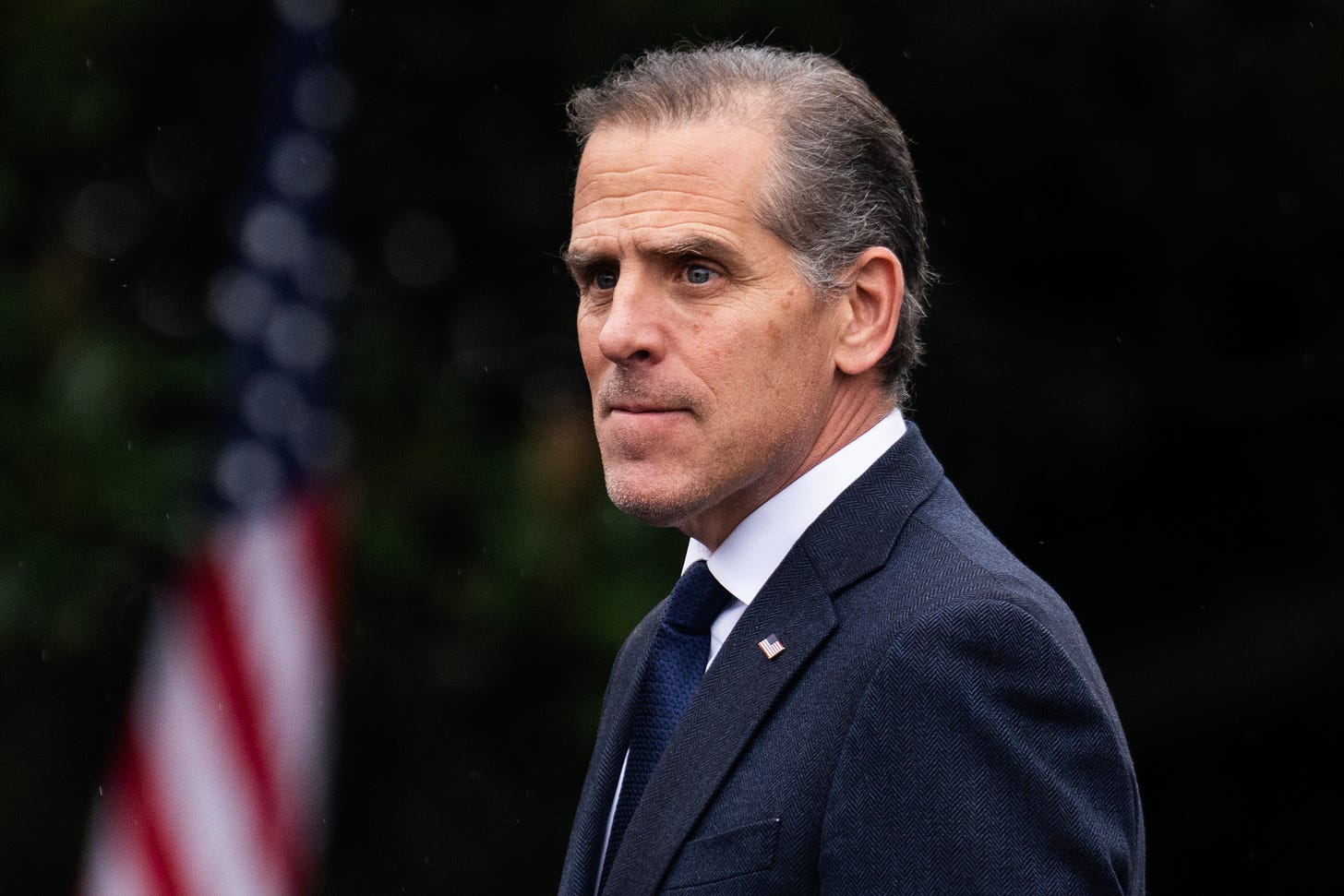
In Defense of the Hunter Biden Pardon
This was a tough call—but consider what Trump’s weaponized Justice Department would have done to Biden’s son.

ON SUNDAY, IN SWEEPING LANGUAGE, President Joe Biden gave a “Full and Unconditional Pardon” to his son Hunter Biden for all “offenses against the United States which he has committed or may have committed or taken part in during the period from January 1, 2014 through December 1, 2024.” The pardon includes the offenses that gave rise to a conviction after a jury trial in Delaware for Hunter knowingly lying about his drug addiction on federal paperwork when he purchased a gun in a Wilmington store in 2018, and for illegally possessing the gun for eleven days.
The pardon also covers the separate case in Los Angeles in which Hunter pleaded guilty following an indictment for three felonies and six misdemeanors involving “a four-year scheme to not pay at least $1.4 million in self-assessed federal taxes he owed for tax years 2016 through 2019”—also the time period marked by his slide back into severe drug addiction after the death of his brother, Beau, from brain cancer. Hunter Biden paid the IRS back, with interest, and has reportedly been sober for years.
The president is getting hammered for having reneged on his earlier promise not to pardon his son. The criticism—outrage, even—is to be expected: For Biden to single out his own son for a pardon among thousands of applicants with far less access to the levers of power smacks of nepotism and unfairness, nudging the president uncomfortably toward the modus operandi of the norm-defying president-elect.
This is fair criticism. But it’s worth keeping three other points in mind.
First, Biden bent over backwards to keep his hands off this prosecution, at considerable cost to his family. He did not remove or change the mandate of the Trump-appointed prosecutor handling the case, even as that prosecutor’s investigation was granted special counsel status last year.
Second, as Biden notes in his announcement accompanying the pardon, his son has been “selectively, and unfairly, prosecuted.” The president correctly explained that “people are almost never brought to trial on felony charges solely for how they filled out a gun form,” and that those who pay late taxes with interest and penalties “because of serious addictions” (like Hunter) are usually “given non-criminal resolutions.” His son “was treated differently” in order “to attack me and oppose my election,” the president wrote.
He has a point—but you don’t have to take my word for it. Trey Gowdy, a former House member (R-S.C.) and federal prosecutor, told Fox News, “I bet you there weren’t ten cases prosecuted nationwide of addicts or unlawful drug users who possessed firearms or lied on applications.” Sen. Lindsey Graham (R-S.C.) also said, “I don’t think the average American would have been charged with the gun thing.” These are piddling charges that would not have seen the light of day but for the fact that Hunter Biden is, well, Hunter Biden.
Third, for all those attacking President Biden for this decision, I’d urge you to look at the bigger picture here. The landscape has changed considerably since June when he ruled out a pardon for Hunter. Not only did Trump—rather than Biden or his vice president, Kamala Harris—win the White House, but the president-elect is clearly hellbent on following through on his promises of retribution and revenge, indicating through his nominations an intention to weaponize the FBI and the Justice Department, even going so far as to say he’ll fire the sitting FBI director before his term is up and replace him with Kash Patel, who has pledged to “go out and find the conspirators, not just in government but in the media.” Trump’s choice for attorney general—after his first awful pick, Matt Gaetz, dropped out—is Pam Bondi, who has promised to investigate the “bad” prosecutors who attempted to bring the rule of law to bear on Trump for his role in the post-2020-election debacle.
The breadth of Hunter’s pardon suggests that his father knows that a Bondi-led DOJ and Patel-led FBI could throw the proverbial book at him on additional charges if given the chance. And should Hunter have faced jail time at sentencing (unlikely, though the possible sentencing range climbs to 25 years), Trump would have sat atop the day-to-day fate of Joe Biden’s son under the custody of the Federal Bureau of Prisons. Ghastly.
LET’S NOT FORGET, TOO, that at the same time the current president is being attacked for pardoning his son, the president-elect has named Charles Kushner as his choice for ambassador to France. Kushner, of course, is the father of Trump’s son-in-law, Jared Kushner who, despite his purely private status during Trump’s first term, was reportedly in charge of vetting pardon requests.
The elder Kushner pleaded guilty on eighteen counts of tax evasion, making illegal campaign contributions, and witness tampering in the early 2000s. Prosecutors alleged that when his own brother-in-law cooperated with federal authorities, Kushner hired a prostitute to seduce him and sent a clandestine video of the encounter to his own sister. Sick stuff. Yet in announcing the intention to nominate Kushner, Trump described him as “a tremendous business leader, philanthropist, & dealmaker.” Former New Jersey Gov. Chris Christie, who handled Kushner’s criminal case as U.S. attorney, called it “one of the most loathsome, disgusting crimes” he ever prosecuted.
Biden made the correct choice to protect his son against the powerful unfettered vindictiveness that is to come in a few short weeks. Let’s hope he uses what’s left of his waning days in office to stave off more of the inevitably impending horrors of the second Trump administration. If it means using his pardon power to protect those who (like Special Counsel Jack Smith) tried their best to uphold the rule of law and the Constitution against the darkest and most menacing American figure of the last century, so be it.
















